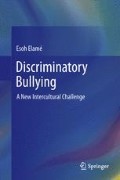Abstract
The term ‘bullying’ in pedagogy is increasingly attributed different meanings, causing an inevitable misapplication of the term. Therefore, the concept of bullying in its common use suffers from a pronounced improper use. Franco Blezza (1999) notes that “the term is used casually, indicating forms of harassment such as verbal and physical, mental and even sexual, both homo or hetero; or to indicate the formation of bands that fundamentally conflict with the rules of the environment in which they developed and operate, and schools are particular in this respect; or even to indicate personal excesses in social circles for lack of self-control and education, which may lead to material acts of symbolic violence; to include many other phenomena, than the experience of those who attended these places will certainly bring, a premise that requires reservations about its use, using proper judgement that for anyone involved in education, professionally and not, however, constitutes an imperative rule”. The use of the term bullying is becoming highly generic depending on who uses it.
Access this chapter
Tax calculation will be finalised at checkout
Purchases are for personal use only
Notes
- 1.
Baldacci Massimo. An approach to problems in social pedagogy, [on-line at the address] http://scienzeformaz.urbino.com/images/image.asp?id=2947&scarica=y. Consulted January 12th.
- 2.
Ibid, pp 2.
- 3.
Ibid, pp 2.
- 4.
“The cards of conflicts” is a game designed for children and adolescents (aged 12–16 years), for the training of teachers, parents and teachers: there are 40 cards and the assigned names recall family themes and its internal relations, the school, the peer group, and of personal identity and feelings. Each card is decorated with an image and at the back is a list of references. The cards of conflicts are an effective tool to bring education and training activities to pre-adolescents and adolescent boys and girls, because they were made through a premise: the conflict situations have a positive role in the development of personality, addressing conflicts helps boys and girls to build a good identity. With the use of “The cards of conflicts” the teenagers express their emotions and interests, listen to the opinions of others, one can experiment in negotiation, and one can assume certain responsibilities. With the expert guidance of the trainer, and through targeted recreational activities, players analyse and reflect and see the conflict, not as a potentially destructive situation, but as a source of learning about yourself and about others. The game’s objectives are to stimulate discussion, narration, role play and conflict resolution. The formative aspect is intended to help participants clearly describe the daily issues and conflict, improve the atmosphere and internal dynamics of the group, and to allow participants to transform their destructive conflicts into challenging goals. This game is produced by the Erickson publishing house. For more details: http://www.lecartedeiconflitti.org/ca.
- 5.
Ibid, pp 2.
Author information
Authors and Affiliations
Corresponding author
Rights and permissions
Copyright information
© 2013 Springer-Verlag Italia
About this chapter
Cite this chapter
Elamé, E. (2013). Intercultural Education and Discriminatory Bullying. In: Discriminatory Bullying. Springer, Milano. https://doi.org/10.1007/978-88-470-5235-2_3
Download citation
DOI: https://doi.org/10.1007/978-88-470-5235-2_3
Published:
Publisher Name: Springer, Milano
Print ISBN: 978-88-470-5234-5
Online ISBN: 978-88-470-5235-2
eBook Packages: Behavioral ScienceBehavioral Science and Psychology (R0)

